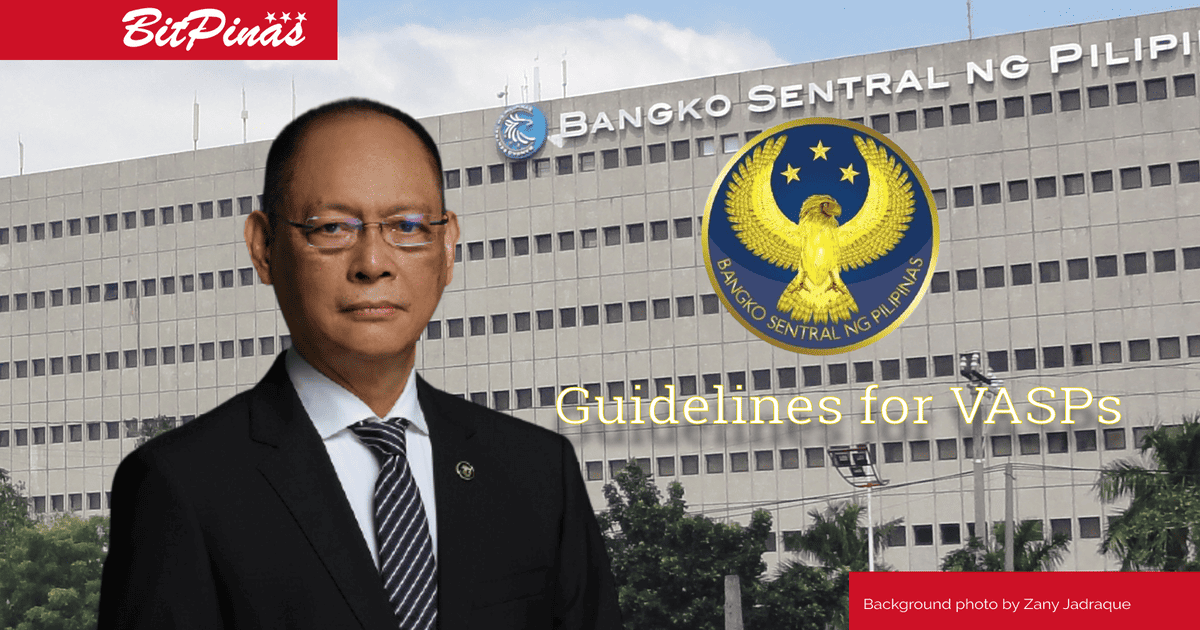How to Get a VASP License in the Philippines for Crypto Exchanges
How much is required to obtain a crypto exchange license in the Philippines? What are the other requirements for the VASP license?

Originally published on January 28, 2021, Updated on June 9, 2022
With Binance announcing its intention to obtain a VASP license in the Philippines, let’s take a look on what a VASP (virtual asset service provider is), how much does it take to have one, and the requirements needed, all public information that BitPinas collected so readers can digest all the information in a single resources.
The Bangko Sentral ng Pilipinas (BSP) has updated its virtual currency exchange (VCE) guidelines to make it more inline with the rules and recommendations of the Financial Action Task Force (FATF), a global anti-money laundering body. In this new “Guidelines for Virtual Asset Service Providers,” the BSP said it recognizes virtual assets (VA)’s potential to revolutionize the way the current financial services are being done, providing a faster and cheaper way to transfer funds and support financial inclusion. At the same time, the BSP also said there are risks involved with higher degrees of anonymity, the velocity of transactions, price volatility, and cybersecurity risks.
With that, BSP Circular No. 1108 Series of 2021 or the “Guidelines for Virtual Asset Service Providers” has tightened the existing rules on cryptoassets to safely guard against their possible use for laundering and counter-terrorist financing (AML-CFT).
This article highlights our key takeaways from the new BSP guidelines published on the BSP website, which it said are based on FATF recommendations and risk management principles. Also, this article is for information purposes only and should not be construed as legal interpretation or advice. Consult with a lawyer if you are planning to register or contact the BSP directly.
Updated Definitions
Some terms frequently used by the BSP are changed to be in line with global standards. Virtual currencies are now called Virtual Assets (VAs) and virtual currency exchanges are now Virtual Asset Service Providers (VASPs).
Virtual assets include digital units of exchange that 1) may have a centralized repository or administrator, 2) decentralized with or without an administrator, or 3) are created or obtained by computing or manufacturing effort.
Virtual asset service providers may mean those that facilitate exchange between virtual assets and fiat currencies, exchange between virtual assets, transfer of virtual assets, and custody of these assets.
Requirements to be a Licensed VASP in the Philippines
The BSP requires the VASP to secure a Certificate of Authority (COA) and must comply with pertinent BSP rules and regulations. They are also considered Money Service Businesses (MSBs).
The minimum paid-up capital is ₱50 million (roughly $1 million) for those VASPs that will have a custody business while those without is required a paid-up capital of Php 10 million (roughly $200,000). There will also be annual fees.
The BSP also requires the VASPs to protect the customer’s wallets and adopt a risk management system to mitigate risks that may arise from outsourcing.
There is also a registration fee of ₱100,000 (roughly $2,000) and an annual service fee of ₱300,000 (roughly $6,000)
Consumer Protection and Diligence
The VASP must create campaigns to educate their customers about safeguarding their virtual asset and fiat currency wallets, cybersecurity tips, the actual fees and charges, and problem resolution procedures.
Crypto wallets are not just any other e-money wallets. In fact, it’s just a representation of the customer’s address on the blockchain (called a public address) which can only be accessed by signing it with a private key. To keep things simple for the customer, some VASPs do not give the private key to their customers, but some also do. With that, the BSP requires the licensed VASPs to disclose and explain to their customers whether the responsibility of protecting the private key rests with them or not.
The BSP also wants VASPs to only engage with other VASPs, financial institutions, and remittance and transfer companies that are duly authorized and licensed by appropriate regulatory authorities.
Transactional Requirements for VASPs
The required information for virtual asset transfers are the following.
- Originator’s name (the sending customer);
- Originator’s account number used to process the transaction (such as the virtual asset wallet);
- Originator’s physical address or national identity number that uniquely identifies the sending customer;
- Beneficiary’s name (who will be receiving the virtual asset?)
- Beneficiary’s account number (for example, the receiver’s wallet address)
Furthermore:
- For transactions of more than Php 50,000 or its equivalent in foreign currency, the originator’s institution must send the above information to the beneficiary institution and make it available upon request of the authorities. This must be transmitted immediately and in a secure manner.
- For pay-outs of more than Php 500,000, enhanced due diligence will be conducted. Payment must only be done via check payment or direct credit to deposit account of the beneficiary.
For Currently Licensed VCES
They can apply for a Certificate of Authority not later than (3) months from the effectivity date of this circular. They must also comply with all the requirements within six months.
Read the BSP’s “Guidelines for Virtual Asset Service Providers” on their website or here in BitPinas.
This article is first published on BitPinas: Key Takeaways: Philippines Guidelines on Virtual Asset Service Providers (VASPs)





